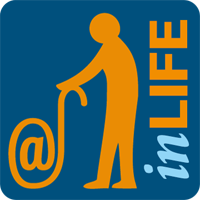inLIFE

INdependent LIving support Functions for the Elderly
(European Commission Horizon 2020 – Research and Innovation Framework Programme, PHC-20-2014-single-stage, Project 643442)
http://www.inlife-project.eu
IN LIFE Project & societal challenges
Societies in Europe are ageing, with the cohort of “the very old” growing at a faster pace than any other age segment of the EU’s population. This increased longevity, coupled with lower birth rates and shifting family structures, means a higher demand of care directed to public and private service providers. The allocation of tasks amongst these services differ from country to country but for all the resources are under pressure.
If introduced appropriately, technology can be a precious ally in tackling this challenge. Well-designed ICT solutions can prolong independent living, help older adults stay socially connected and facilitate sustainable integrated care.
For older adults with mild cognitive impairment and different stages of dementia the IN LIFE project has developed strategies and tools in different areas of independence. The aim of the project was to test how new and existing flexible ICT solutions can assist elderly users with cognitive impairment in organising, carrying out and completing everyday tasks (e.g. activities of daily living, communication, health maintenance, mobility and socialisation tasks) and how these ICT solutions can help them stay and feel independent.
On different pilot sites in six countries (Greece, Slovenia, Spain, Sweden, The Netherlands, UK) IN LIFE has offered all-around, personalised, multi-faceted ICT solutions and services addressing diverse daily activities (eating, physical activity, commuting, mental stimulation, communication, social interaction, etc.) to users with cognitive impairment living in their own home or in sheltered homes, as well as to their formal and informal carers. Over the duration of the project, more than 1.800 end-users participated in the project.
A number of services and tools where developed, deployed and tested. These include the IN LIFE platform itself, which provides easy and personalized access to all the supported Ambient Assisted Living (AAL) services, as well as a tele-monitoring platform allowing for almost real-time monitoring of vital signs (including alerts with user localisation), and a number of online applications, fall detection solutions and other security services.
During the lifetime of the project AAATE organised several workshops, among which:
“Change management as a success factor in the implementation, scaling up and transfer of digital health & social care solutions” (Sheffield, 12 September 2017)
- Change Management Workshop report (PDF document, 2017)
“Strategic aspects of standardisation and certification in the field of eAccessibility & eInclusion” (Sheffield, 12 September 2017)
“Ageing better IN real LIFE! Technology enabled strategies and tools for supporting older adults living in the community” (Madrid, 17 January 2018)
Information sheets about the outcomes of the project have been prepared by AAATE on behalf of the consortium, targeting the different stakeholder groups:
Read interviews with consortium members Katja Laakso, Jon Arambarri, Sarah Kate Smith and Belinda Black, and a report from the IN LIFE Consortium co-organised workshop on Strategic aspects of standardisation and certification in the field of eAccessibility & eInclusion.
Conference papers (pre-print)
Panou, M., Cabrera, M.F., Bekiaris, E., Touliou, K. ICT services for prolonging independent living of elderly with cognitive impairments – IN LIFE concept. AAATE 2015. Panou et al._AAATE 2015
Christian Galinski, and Blanca Stella Giraldo Perez. The need for information on standards on eAccessibility&eInclusion – Based on the experience of the EU-project IN LIFE. AAATE 2017. Galinski- Giraldo Perez_AAATE 2017
Back to AAATE Projects
